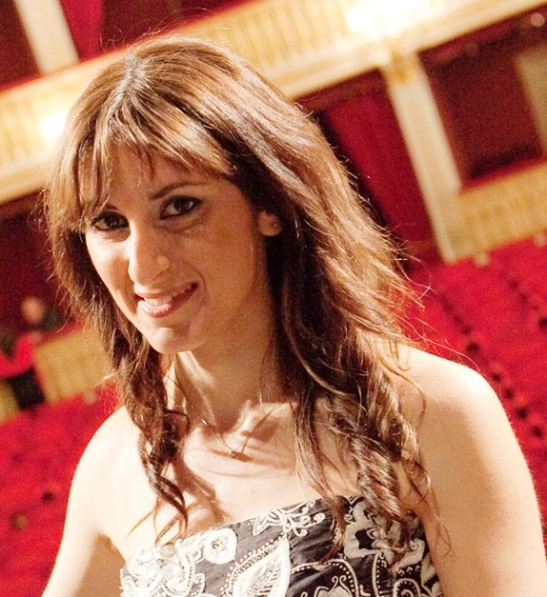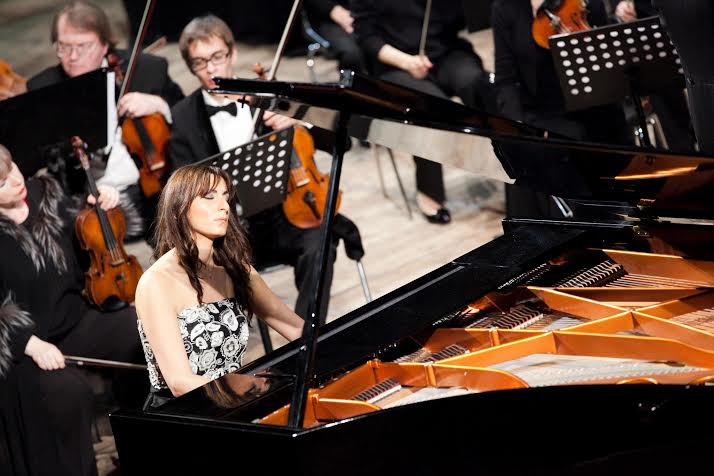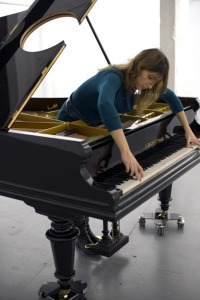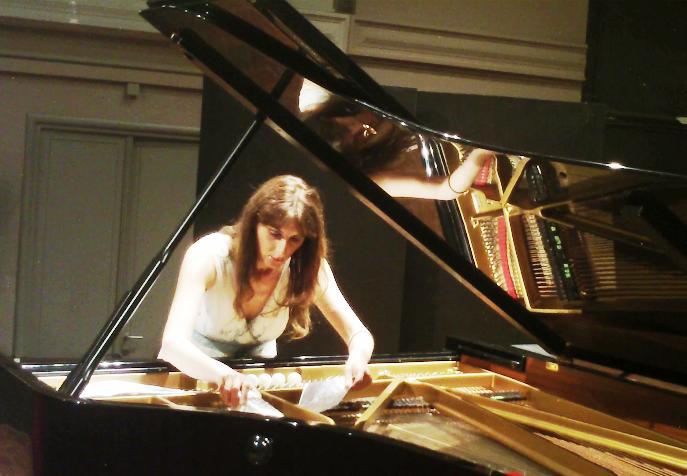|

|
|
Giusy Caruso
Pianist
|
Giusy, can you tell us what inspired you to become a classical pianist when you were a child?
I was lucky to be born into a family of music lovers. Both my grandfathers played many instruments by ear (guitar, mandolin, accordion, clarinet and keyboard) and, when I was a child, I was absolutely fascinated by my father playing the electric keyboard.
I started reproducing sounds and songs by playing on a little keyboard bought for me by my father who was rather jealous every time I tried to touch his cherished instruments.
Then I started attending a dance beginner course where there was a pianist accompanying the lessons. At the end of every lesson, I used to open the marvelous piano just to touch its black and white keys (without ever playing it). It was a strong and special attraction for me because I was feeling a tactile experience different from my little instruments. It was bizarre, but at the age of only nine years old, I remember I was determined to become a pianist and I begged my mother to let me leave my dance classes in order to attend piano lessons.
Finally, I was bought my first upright piano, which I still like practicing on. I attended the Conservatoires in my region, Calabria (Italy), where many musicians and some very good piano professors inspired me by giving me a solid musical knowledge and a strong sense of discipline. Music requires constant practice like in sports because you need many hours practice every day to prepare for concerts and keep your fingers warm and agile, always ready to play.
How easy was it to become an artist in your region? Did you have to face difficult choices to become an artist?
After receiving my diploma in piano and my university degree in Philosophy in Calabria, I decided to study abroad. Only recently, the Italian Conservatoires evolved their system according to the European regulations which provide cross-cultural exchange as part of their internal Erasmus projects.
At that time, the opportunity to study music abroad was quite a challenge. A large dose of courage drove me to pursue my dreams because Calabria could not offer the opportunity to be part of a lively international cultural environment as it does now.
Strong willed, I won over my insecurities and fears and I started organizing my study path using my own strengths and resources. I had understood that I would need to go abroad to enlarge and develop my artistic competences.
I should say that everything that has happened since then was as a combination of interwoven events. Quoting a line from one of my favourite books by the American psychologist Hopcke: "
Nothing happens by chance."
I believe that in life there are transition periods and these serve to highlight signs and lead us to make choices. Using the terminology of Hopcke, these moments are called Synchronic-Destiny.
|

|
|
Giusy Caruso in a classical concert
|
I lived my first
Synchronic-Destiny moment when I decided to follow a piano master class at the “Mozarteum” in Salzburg. During my stay there, I had the opportunity to meet several well-known musicians from other parts of the world. Since I was a very shy person coming from a little town in Southern Italy, I was suddenly flooded with a sense of openness towards the different cultures present, who were linked by a common goal: sharing Music.
After this experience, I wanted to challenge myself and I was determined to study and perform in concerts abroad. I then began to travel and to reap the benefits of feeling "a citizen of the world" through Music. The benefits I drew from my personal history have now led me to suggest to other young musicians that they take advantage of any opportunities to study abroad.
As an artist you need a lot of preparation and discipline. Can you tell us how you have been affected by the need to audition? Has there been someone who supported you in this process?
When you feel completely devoted to your passion, it becomes a natural mission to carry on. I should say that music became a “life style” for me right from the beginning.
It is indeed a hard discipline. I organize my time by dividing the day into practicing the instrument (almost 5 or 6 hours every day) and often combining this with theoretical studying and teaching.
Concerning my music career, I met many professors and well known musicians who supported me with their teachings and suggestions. However, I should say that when you want to develop an artistic career the best support comes mainly from your own intention and determination.
What do music academies offer today? How easy is to start a career there? In today’s world does having a piano diploma help you to become a successful artist?
I think that a successful career builds on a combination of talent, discipline, determination and fresh artistic ideas which capture the attention of the audience.
The Academies and Conservatoires are the basic educational institutions where musicians learn and develop their their musical and professional background. These institutions offer a good starting point. A musician then has to invest a lot of his own strength to develop his own professional artistic career. Competitions and auditions undoubtedly constitute another chance to develop one’s own career but these are not the only means. I do emphasise once more how personal talent and creativity determine the success of a person’s artistic career.
At a certain moment in your career, you decided to experiment with contemporary classical music. Why this choice?
The novelty of experimenting with new timbres, sounds and techniques was the triggering factor, which lead me to open and enlarge my repertoire to classical contemporary music. Today, this is still a hard path for those musicians strictly connected to the classical or the romantic/modern music tradition.
Contemporary music represents an aesthetic challenge and a new frontier of communication for both composers and performers. I do not avoid classic repertoire completely but, on the contrary, I am interested in combining it with the contemporary way of composing and performing in order to give a pragmatic idea of how musical processes are evolving.
Do you need to be courageous enough to undertake such a profession? Where do you get your strength to go ahead?
Talent and passion are the first elements triggering any professions, dreams or projects. The strength comes out unconsciously, I think. The motivation is inside your genetic code: you decide because your life decides for you, at a certain point. I do not like shortcuts and I prefer working hard in order to ensure I give a great performance. I think everyone is responsible for determining their own destiny. Constant effort, supported by talent and determination, is sooner or later, rewarding. I am learning that life is like a puzzle whose pieces have a sense only when they all fit together. In this way, they have their own form and their own logical explanation. I recently watched an Indian movie “Lunch box” whose motto is shown in its last sentence: "Even on a wrong train you can get to the right destination."
It is not easy, but you have to go on persevering, because even the most difficult periods lead up to the right ending and eventually to success.
Critics say that contemporary music remains inaccessible for many. What is your experience? How many people are interested in contemporary classical music?
|

|
|
Giusy Caruso plays the famous contemporary installation created by the visual artists
Allora & Calzadilla
https://www.youtube.com/watch?v=TB8sPDzesbM
|
Nowadays, only an audience of experts consider contemporary music as accessible as classical music Normally, people are more interested in commercial music, pop – rock – jazz because these genres are broadcast on the radio and television. This music encompasses our daily life. People should be encouraged to try listening to classical and contemporary music, which requires not a passive listening but an interactive and critical understanding. Classical and contemporary repertories are full of philosophical meanings, recalling images and different timbres through the instruments.
When I perform, I try to encourage the audience to understand and enjoy classical and contemporary music by offering them recitals in the form of lectures or by matching different forms of Art: visual art, singing, dancing and theatre. I often interact with the public asking their feedback and their reaction in order to stimulate an active discussion.
I like to propose programmes guiding my audience along specific performance paths and aesthetical themes often by linking and combining different genres, historical periods and cultures.
Having been fascinated by this way of performing, when I arrived in Belgium I began doing artistic research based on the influence of Indian music in the Western contemporary piano repertoire. This research led me to perform an original project entitled “Re-Orient” in collaboration with an Indian singer and some dancers.
I am very satisfied with the results of this kind of performance that I’m trying out in various countries. I have just come back from successful and rewarding tour of Thailand.
Do you think that being a woman makes a difference in undertaking such a career? Have you ever experienced any sort of discrimination in your artistic environment as a woman?
To be honest I have never experienced discrimination in my artistic environment. I know that in many professions women have problems following their career, but I have not experienced that.
. I think that in music people are judged not by their gender but only by their capacity to express themselves and communicate. It is clear that during my artistic path I experienced some injustices but this was not linked to the fact that I was a woman.
How do you prepare yourself before performing a concert?
My preparation for an artistic performance is very meticulous and it takes many hours every day, from 6 to 8 hours if necessary. At first, you have to practice your score and analyse every piece in order to give it a musical meaning, in respect to the style of the work and the composer’s warnings. This part requires both practicing on the instrument and theoretical studying.
|

|
|
Giusy Caruso in a contemporary performance
|
I am also used to listening to many historical interpretations performed in the past in order to finally refine my own personal way of playing.
Since I perform by heart, I also spend a lot of time in mental preparation for my performance. I practice yoga for augmenting and improving my concentration, and the control and relaxation of my muscles. I also like swimming and running because practicing sports is important to eliminate tensions and refresh your mind.
Have your own culture and traditions ever been a value or an obstacle for your career?
I am proud to bring a strong message from my native land through my musical performances. Actually, I also feel I bring with me all those foreign cultures I experienced intensely and metabolized over the years. I feel my artistic research and the way I perform the music enhances the international and multicultural aspects of the music, and helps the audience to connect with the culture of the composer.
Concerning my region, Calabria, I should say that although it is a land full of talent and resources, it continues to remain a hard land to live in; we must work hard in order to stand out and achieve real growth. Especially in this time of crisis, culture is increasingly destined to become a secondary need compared to other priorities, leaving very little opportunities to artists.
What are your dreams?
My fundamental dream is to continue to bring music to the heart of the people. I have followed this dream from the beginning of my studies: I consider my playing to be my mission, my life’s work.
| Short Biography |
|
Giusy Caruso is a talented young pianist from Southern Italy (Calabria region).
She gained a Piano Diploma cum laude and from the Conservatoire “F. Torrefranca” of Vibo Valentia (Italy) and a Post-Master’s Degree in Piano cum laude from “Politecnico Internazionale Scientia et Ars” of Vibo Valentia (Italy).
Giusy gained also a University Degree in Philosophy.
She continued her career in Northern Europe where she could expand her knowledge thus gaining a Master’s Degree in Piano Solo Performance with the highest distinction from Codarts, the Conservatory of Rotterdam (The Netherlands) and a Post-Master’s Degree in Contemporary Music with the highest distinction from the Royal Conservatory and University of Ghent (Belgium).
She also started to enrich her performances with interaction between her music and dance and theatre. She received many awards from important institutions and commendations by distinguished music critics. Not only a musician, but also a teacher and a researcher, Giusy is a polyvalent figure who devotes herself to her piano career.
Contacts Details
www.giusycaruso.com
|
.png)
.png)